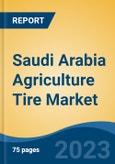Speak directly to the analyst to clarify any post sales queries you may have.
10% Free customizationThis report comes with 10% free customization, enabling you to add data that meets your specific business needs.
Recent Developments
Saudi Arabia does not have tire manufacturing facilities, and the market is also import driven, and the government of Saudi Arabia is in talks with tire manufacturers to start manufacturing units in the country. For instance, Kumho/Blatco is planning to establish a tire manufacturing plant in the country. Similarly, the National Tire Company (NTC) is also planning to build a greenfield tire manufacturing plant in Saudi Arabia. The increase in the exports of agricultural products from the country to the nearby areas has also led to the growth of the Saudi Arabia agriculture industry, and this has ultimately led to the rise in the demand for agriculture tires in the country.The technological advancements in agriculture and the increase in the adoption of advanced machinery and vehicles are also leading to the increased demand for agriculture tires in Saudi Arabia. Many large-scale agricultural activities use a variety of modern technologies, and the government consistently supports the agricultural sector in accordance with WTO (World Trade Organization) commitments. All this is also going to contribute to the demand for agriculture tires in Saudi Arabia.
Rise in Demand for Agricultural Mechanization
Mechanization in agriculture has advanced significantly in the nations like Saudi Arabia over the past few years. Tractors and internal combustion engines were introduced as power sources, and they quickly covered vast agricultural areas, bringing about a revolution in the agriculture industry. To expand farm operations, labor-saving technologies, particularly in tractors and harvesters, are being adopted more frequently. A structural evolution that will aid in the increased adoption of cutting-edge agricultural machinery tools in agricultural operations will be significantly strengthened by increased economic liberalization. To support the increased weight of farm machinery, which has significantly increased in size over the past three to five years, tire manufacturers are also becoming more and more involved in this process. The increased utilization of agriculture machinery will increase the demand for agriculture tires in Saudi Arabia.Higher Yields Offered by Low-Pressure Tires
There is a rising need for a new line of agricultural tires with very high flexion (VF) in the agricultural market. Farmers, on the other hand, tend to invest in tires that offer better operational efficiency and a backup warranty. Companies like Continental have already created VF tires that are more durable, safer, and put less strain on the ground. All these developments by the key players will also generate new opportunities for the Saudi Arabia agriculture tire market in the forecast years.Commodity Price Volatility
The price of commodities has a significant impact on the market for agricultural machinery. Farmers' purchasing power is lowered because of the decline in primary commodity prices, which also influences tire and agricultural equipment sales. Agriculture tire replacement cycles are also impacted by commodity prices. Agriculture tires went through more replacement cycles when commodity prices were down. COVID-19 has affected the potential future costs of several agricultural products around the world, and this has impacted the market in Saudi Arabia.Food production and productivity are under intense pressure due to rapid urbanization and rising living standards. Over the forecast period, the demand for agriculture tires in Saudi Arabia is anticipated to increase because of the agricultural sector's expansion in response to the rising demand for food products in the country.
Global competitors are primarily concentrating on their unique strengths and focusing on retaining their clients by offering specialized services to tractor and harvester manufacturers. As the demand for agricultural tires rises in the agricultural sector due to the rising demand for agricultural produce, businesses in the sector also concentrate on expanding their production capacity.
Market Segmentation
The Saudi Arabia Agriculture Tire Market is segmented by application type, tire type, and by region and competitive landscape. Based on Application Type, the market is segmented into Tractors, Combine harvesters, Sprayers, Trailers, Loaders, and Others. Based on Tire type, the market is segmented into Bias and Radial, and based on region; the market is segmented into Central Region, Western Region, Eastern Region, Southern Region, and Northern Region.Company Profiles
Bridgestone Corporation, Balakrishna Industries Limited, Continental AG, Michelin Group, Nokian Tyres Plc, Pirelli & C SpA, Apollo Tyres Limited, Goodyear Tire & Rubber Company, Yokohama Rubber Company Limited, and MRF Limited.Report Scope:
In this report, Saudi Arabia Agriculture Tire Market has been segmented into the following categories, in addition to the industry trends, which have also been detailed below:Saudi Arabia Agriculture Tire Market, By Application Type:
- Tractor
- Combine Harvester
- Sprayers
- Trailers
- Loaders
- Others
Saudi Arabia Agriculture Tire Market, By Tire Type:
- Bias
- Radial
Saudi Arabia Agriculture Tire Market, By Region:
- Central Region
- Western Region
- Eastern Region
- Southern Region
- Northern Region
Competitive Landscape
Company Profiles: Detailed analysis of the major companies present in Saudi Arabia Agriculture Tire Market.Available Customizations:
With the given market data, the publisher offers customizations according to a company’s specific needs.This product will be delivered within 1-3 business days.
Table of Contents
Companies Mentioned
- Bridgestone Corporation
- Balakrishna Industries Limited.
- Continental AG
- Michelin Group
- Nokian Tyres PLC
- Pirelli & C SpA
- Apollo Tyres Limited
- Goodyear Tire & Rubber Company
- Yokohama Rubber Company Limited
- MRF Limited.








